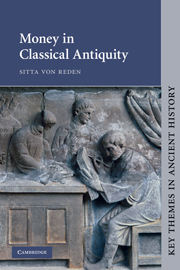Book contents
- Frontmatter
- Contents
- List of figures and tables
- List of maps
- Preface and acknowledgements
- Greek and Roman monetary system and coin denominations
- List of abbreviations
- Maps
- Introduction
- 1 Monetization: issues
- 2 Monetization: cases
- 3 Monetary networks
- 4 Cash and credit
- 5 Prices and price formation: issues
- 6 Prices and price formation: a case study
- 7 Sacred finance
- Epilogue: monetary culture
- Appendices
- Glossary
- Bibliographical essay
- References
- Index
1 - Monetization: issues
Published online by Cambridge University Press: 05 August 2012
- Frontmatter
- Contents
- List of figures and tables
- List of maps
- Preface and acknowledgements
- Greek and Roman monetary system and coin denominations
- List of abbreviations
- Maps
- Introduction
- 1 Monetization: issues
- 2 Monetization: cases
- 3 Monetary networks
- 4 Cash and credit
- 5 Prices and price formation: issues
- 6 Prices and price formation: a case study
- 7 Sacred finance
- Epilogue: monetary culture
- Appendices
- Glossary
- Bibliographical essay
- References
- Index
Summary
INTRODUCTION
If you consult an ordinary dictionary, you will find monetization defined as establishing something (e.g. gold or silver) as legal tender in a country. If legal tender had been a pervasive concept in antiquity, and if coins had been the only tender, monetization would then refer to the introduction of coinage. But when we consider that valuable objects and metal bullion, too, were tendered by custom or public approval, we find that monetization was not a process involving solely the establishment of coinage by governmental act. In this chapter we will explore monetization more broadly as the development of monetary institutions, intertwined as they were with the development of coinage. In the second chapter I shall compare a number of different cases and forms of monetization in the Greek and Roman world.
It is open to question whether it was economic or political institutions that brought into being money and coinage. The problem is linked to the major controversies in the debate over the ancient economy. Those who see a significant development of markets from an early period of classical antiquity onwards tend to link monetization to the transformation of a barter economy into a market economy. Those who believe that markets were relatively late developments in ancient history emphasize that monetization was a result of community building and state development.
- Type
- Chapter
- Information
- Money in Classical Antiquity , pp. 18 - 34Publisher: Cambridge University PressPrint publication year: 2010



